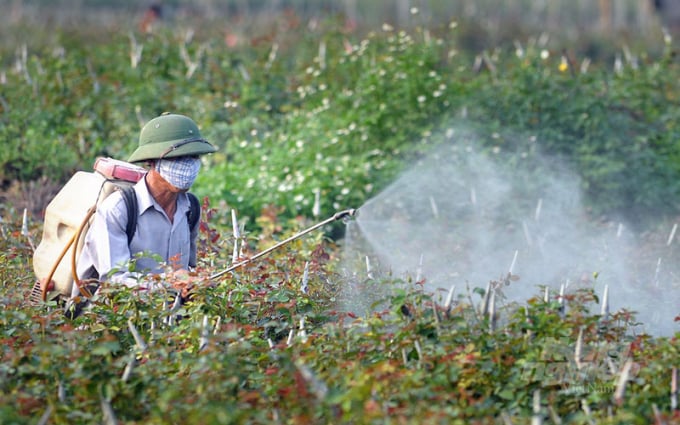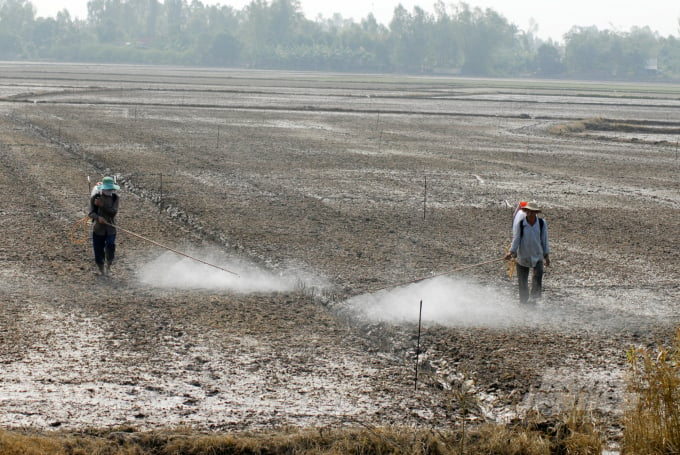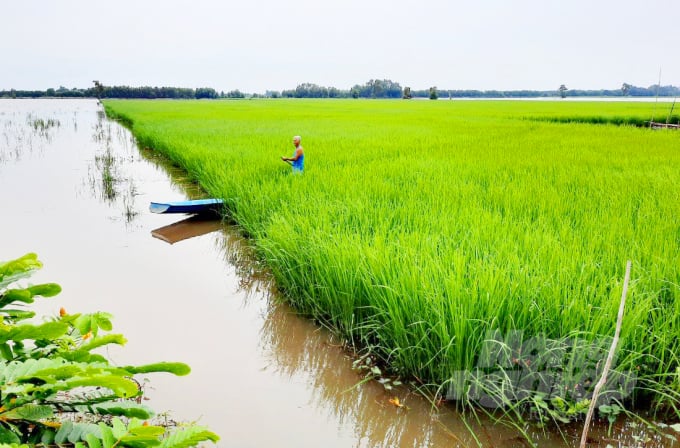June 19, 2025 | 09:22 GMT +7
June 19, 2025 | 09:22 GMT +7
Hotline: 0913.378.918
June 19, 2025 | 09:22 GMT +7
Hotline: 0913.378.918

Many places in the Mekong Delta are still abusing fertilizers and chemical pesticides. Photo: Pham Hieu.
Fertilizers and chemical pesticides abuse in the Mekong Delta has received a warning for many years but in reality, the change has been very slow. Meanwhile, it’s common knowledge that this act of abuse makes the risk of land and water contamination, food insecurity, and degradation of natural ecosystems increasingly present.
A recent report of the Department of Plant Protection (MARD) shows that compared to other regions and areas in the country, the amount of fertilizer used in the Mekong Delta is 42% higher, 72% higher in the case of chemical pesticides. The provinces of Ben Tre, Tien Giang, and Dong Thap all use fertilizers and chemical pesticides many times higher than other localities in the country.
Local farmers are in fact the ones who experience the consequences of fertilizers and chemical pesticides the deepest. All shared the same opinion when asked: The fertility and nutrients in the soil have gravely decreased.
In order to ensure crop productivity, there is currently no other choice but to maintain and increase the dose used, all the more reason to incur additional costs while remaining unable to “revitalize” the soil.
As for the natural ecosystem, the rural people of the Mekong Delta realize that the richness of the past has increasingly disappeared. Whether it is in the garden or outside the field, it is difficult to find fish and shrimp for daily meals.
Many wild plants in nature that used to grow in abundance (holly, water banana, stenochlaena palustris, etc.) have become scarce and difficult to find due to the overspraying of chemicals.

The former richness of the ecosystem is slowly disappearing. Photo: Le Hoang Vu.
In order for farmers to stop using chemical fertilizers and pesticides following their “experience” and “will”, Mekong Delta localities have constructed and initiated clean agricultural models and renewed agricultural extension activities.
However, most farmers find it difficult to keep up because of a lack of capital and production capacity. Clean agricultural products are easily equated with similar products when brought out to the market due to insufficiency of guarantee.
In early December, the Department of Plant Protection, Dong Thap Department of Agriculture and Rural Development and CropLife Vietnam signed a contract to launch “Cooperation program on safe and effective use of pesticides”.
The guidance program on safe and effective use of pesticides will be implemented from 2021 to 2025 in Dong Thap. The goal is to help local farmers access and receive training in principles of safe, effective and responsible use of pesticides.

The goal is to help local farmers access and receive training in principles of safe, effective and responsible use of pesticides. Photo: Le Hoang Vu.
The program sets goals by 2025:
Mr. Hoang Trung, Director of the Department of Plant Protection said that the Department will assume the prime responsibility and coordinate with the parties to develop a set of documents and videos on instructions for safe and effective use of pesticides as well as documents on collection and treatment of drug packages after use.

The Mekong Delta will be able to move towards sustainable agriculture after solving the issue of fertilizers and chemical pesticides abuse. Photo: Le Hoang Vu.
In addition, the Department of Plant Protection will organize training for technical staff of the provincial Department of Agriculture and Rural Development on regulations related to pesticide management and urge the parties to follow the plan.
"We believe that the program will contribute to heightening the responsibility of farmers, improving the value of Dong Thap agro-products, raising the status of Vietnamese agro-products in general," said Mr. Hoang Trung.
The localities in the Mekong Delta are entering the stage of strongly implementing the Government's Resolution No. 120/NQ-CP on sustainable development of the Mekong Delta to adapt to climate change, including the target of improving agro-products value and competitiveness.
This is a new opportunity for the Mekong Delta to move towards sustainable agriculture. The Mekong Delta will be able to move towards sustainable agriculture after solving the issue of fertilizers and chemical pesticides abuse.
Translated by Samuel Pham
![Turning wind and rain into action: [9] Digitizing hydrometeorological data in response to climate change](https://t.ex-cdn.com/nongnghiepmoitruong.vn/608w/files/news/2025/06/17/z6704423696987_15fd32ffc26d590d204d520c9dac6786-nongnghiep-165943.jpg)
(VAN) Farmers have begun accessing hydrometeorological applications to adjust their cropping schedules, aiming to ensure productivity and adapt to climate change.
![Turning wind and rain into action: [8] Real-time salinity detection and early warning technology](https://t.ex-cdn.com/nongnghiepmoitruong.vn/608w/files/news/2025/06/17/z6704423696987_15fd32ffc26d590d204d520c9dac6786-nongnghiep-151127.jpg)
(VAN) Thanks to the integration of modern hydrological-hydraulic models, remote sensing technologies, and artificial intelligence, the accuracy of hydrological forecasting has significantly improved.
![Turning wind and rain into action: [7] Early disaster warnings help marine farmers minimize losses](https://t.ex-cdn.com/nongnghiepmoitruong.vn/608w/files/news/2025/06/17/z6704423696987_15fd32ffc26d590d204d520c9dac6786-nongnghiep-142942.jpg)
(VAN) In recent years, thanks to early disaster warnings and forecasting, marine farmers in Khanh Hoa province have been able to reduce risks and losses, thereby improving production efficiency.
![Turning wind and rain into action: [6] ‘Four on-the-spot’ disaster management software](https://t.ex-cdn.com/nongnghiepmoitruong.vn/608w/files/news/2025/06/17/e5a48259d6a262fc3bb3-nongnghiep-183800.jpg)
(VAN) By simply activating the scenario on the disaster management software, the relevant authorities immediately know how many households need to be evacuated, where to evacuate them to, and by what means of transportation…
![Turning wind and rain into action: [5] Hue applies modern technology in disaster forecasting](https://t.ex-cdn.com/nongnghiepmoitruong.vn/608w/files/news/2025/06/17/z6704423696987_15fd32ffc26d590d204d520c9dac6786-nongnghiep-093938.jpg)
(VAN) In Hue city, modern technology has recently been applied in meteorological and hydrological forecasting and warning, helping to reduce the damage caused by natural disasters.

(VAN) A cutting-edge farming technique being implemented on an experimental ranch in Arizona's Sonoran Desert has already saved a billion gallons of water over five years, according to Civil Eats.

(VAN) Poultry and pig production and the environment can be boosted through enhanced water technology, according to new research.